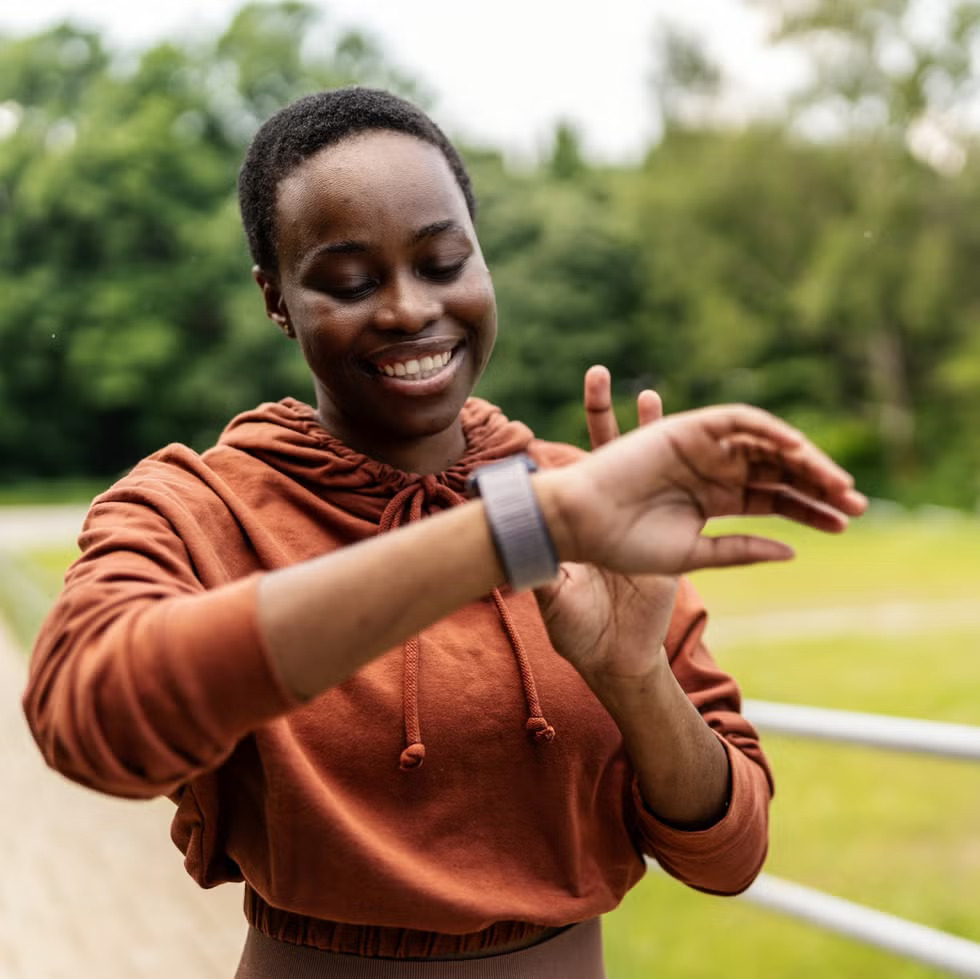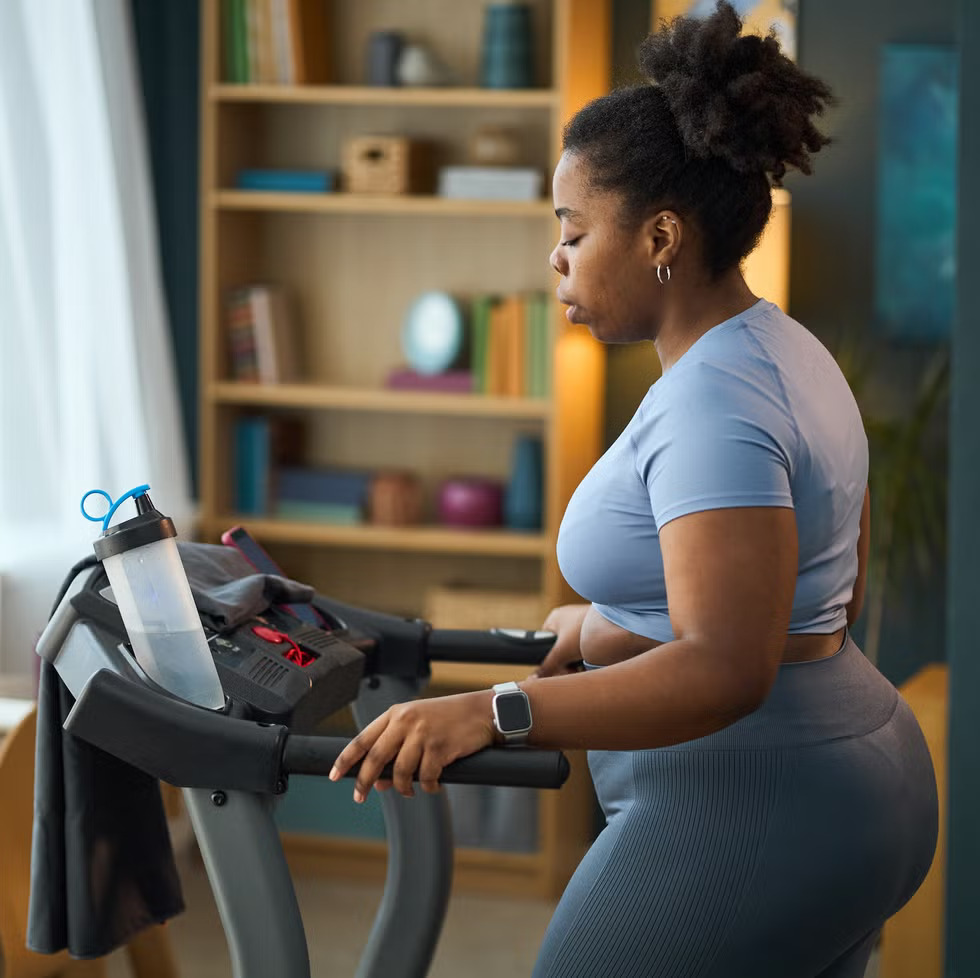So You're Getting Your Steps In Every Day—But Is It Enough?
by Jade Biggs
Published on Nov 18, 2025
Eat your veggies... Get your steps in... Drink plenty of water... These are just some of the health and fitness messages we've all been told to live by. But, as our lives have modernized (along with the many fitness trends that have come and gone thanks to social media), those messages have somewhat shifted.
When it comes to fruits and vegetables, for example, eating your "five a day" has been rebranded into "plant points," while some experts have suggested that eight glasses of water a day (a.k.a. the gospel) is actually too much. How many steps we should really do each day has also come under question more than once.
Beyond the number of steps we ought to aim for, though, are steps alone actually enough to keep fit?
With so much mixed messaging in the health and fitness world, we decided to do some digging—meaning you can spend less time stressing about how many steps you should or shouldn't do and more time, well, actually doing them. To find out whether getting your daily steps in is "enough," we spoke to GP and IQdoctor medical adviser, Dr. Suzanne Wylie, as well as Samantha Cubbins, a Strength and Conditioning Coach and Lifting Club Manager at Gymshark.
Why is walking good for you?
"Walking is particularly good for improving a number of key health markers," says Dr. Wylie. "It can help lower blood pressure, improve cholesterol levels, aid weight management, and enhance insulin sensitivity, which is especially beneficial for those at risk of type 2 diabetes."
In addition to the physical benefits, Dr. Wylie adds that: "Walking is also excellent for mental wellbeing, reducing stress and symptoms of mild depression or anxiety."

How many steps should we walk per day?
We probably don't need to tell you that walking 10,000 steps per day is considered the golden number. But the origins of this figure can be traced back to a marketing campaign, rather than any scientific findings. In the 1960s, a company began selling a pedometer called the Manpo-kei shortly before the Tokyo Olympic Games. Manpo-kei's marketing campaign focused on the number 10,000—as did its name. When roughly translated, it means "10,000-step meter."
"As a GP, I often remind patients that while the idea of walking 10,000 steps a day is a useful benchmark for general activity, it isn't a magic number," Dr. Wylie says of walking 10,000 steps per day. "It originated from marketing rather than medical evidence, yet it remains a helpful goal to encourage people to move more."
Clearly, nailing 10,000 steps a day isn't the be-all and end-all. "For many adults, particularly those who spend long periods sitting, simply increasing daily steps, even if not reaching 10,000, can bring measurable health benefits such as improved mood, better sleep, and enhanced cardiovascular fitness," notes Dr Wylie.
"For those who struggle to reach 10,000 steps, perhaps due to work commitments or mobility issues, it's worth remembering that every bit of movement counts," Dr. Wylie continues. "Even 6,000 steps a day, particularly at a brisk pace, can deliver substantial benefits," she adds, suggesting simple ways to get your numbers up, like taking the stairs instead of the lift or going on a short lunchtime walk.
How does walking compare to other workouts?
"Walking is a great low-impact way to improve 'good' health," says Cubbins, adding that it is particularly well-suited for individuals for whom HIIT or other more strenuous exercise isn't an option, like those with chronic joint pain.

"If weight loss is the goal, incorporating HIIT and strength training will burn more calories during the session than walking will," she goes on. "Depending on your intensity, you will also continue to burn post-workout. However, its high intensity may not be suitable or enjoyable for everyone."
"In comparison to structured exercise, daily walking offers many of the same benefits, though usually to a lesser intensity," adds Dr. Wylie. "Beyond walking, I usually encourage patients to add strength training (such as light weights or bodyweight exercises), flexibility work (like yoga or Pilates), and lifestyle adjustments such as balanced nutrition, good sleep hygiene, and stress management."
She goes on: "Together, these form a more holistic approach to long-term health than focusing on step count alone."
Can you "see results" through walking alone?
Evaluate your fitness goals
Whether or not you'll 'see results' through walking depends on what exactly your desired results are. If your main aim is to build a balanced lifestyle and up your activity levels, then meeting your daily step goal (whatever that number is for you) doesn't need to be measured by a change in your physical appearance.
On the flip side, if you're hoping to lose weight or tone up, Cubbins explains that "you will need to add in strength training sessions to see more results in a shorter timeframe."
"While walking 10,000 steps a day will help you to lose weight and tone up, walking alone won't build muscle mass in the same way as weight training," she adds. "I would recommend pairing daily walks with two strength training sessions per week, along with mobility training."
Spice up your steps
"When it comes to long-term health, the intensity of activity is often more important than step count alone," says Dr. Wylie. "Moderate-to-brisk walking that raises the heart rate slightly and quickens breathing has greater benefits for cardiovascular health than a slow stroll, even if the total step count is lower."
"If you can comfortably walk 10,000 steps, I would recommend varying your walking workouts by picking up the pace during shorter sessions, like intervals," adds Cubbins. "This change of pace will raise your heart rate quicker, helping to burn more calories and make the walk feel more like a workout." Beyond that, "you can also introduce inclines or a weighted vest to further engage your glutes and legs to help tone your lower body."
"Varying the intensity through speed, incline, and by adding resistance, will improve your fitness," she goes on. "Staying at the same pace, same incline, same resistance will get you to a point with your fitness, but then you will plateau. If you want to improve, you must add incline, resistance or speed."

The desk dilemma
What you do when you're not walking can have just as much of an impact on your health, according to Dr. Wylie. "If someone walks 10,000 steps a day but spends the rest of their time sitting, for example, working long hours at a desk, they may still be considered fairly active, but not necessarily 'fit' in a broader sense," she says. "Sedentary behaviour has independent health risks, so breaking up long periods of sitting with short bursts of movement or stretching remains important, even for regular walkers."
Can you do too many steps?
"While walking is generally safe, it is possible to overdo it, particularly if someone increases their step count too rapidly or walks on hard surfaces without proper footwear," says Dr. Wylie. When it comes to walking, persistent joint or muscle pain, fatigue, or a decline in performance are all signs you might be overdoing it, she adds. "Rest days, stretching, and gradual progression are key to avoiding injury," the expert goes on.
As well as a physical impact, there can be a mental health impact when it comes to over-walking. "While step goals, like many other fitness goals, can be great motivational tools to track progress and build a consistent routine, they can also contribute to an unhealthy obsession if focused on too much," says Cubbins. "It's important to remind yourself that a healthy and happy lifestyle involves taking days off and listening to your body's needs."
The fitness expert goes on: "If you find that you can get fixated on numbers and unhealthy habits, I would recommend not tracking your steps and instead habit-stacking your walks with things you enjoy doing, like catching up with your friend or listening to a new podcast."
This article is not intended to be a substitute for professional medical advice or diagnosis. Always seek the advice of your physician or other qualified health provider with any questions you may have regarding a medical condition.

This article originally appeared on Cosmopolitan.com/uk. Minor edits have been made by the Cosmo.ph editors.